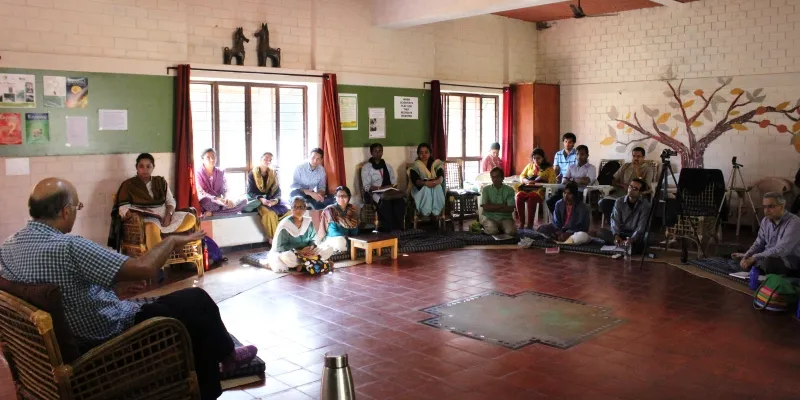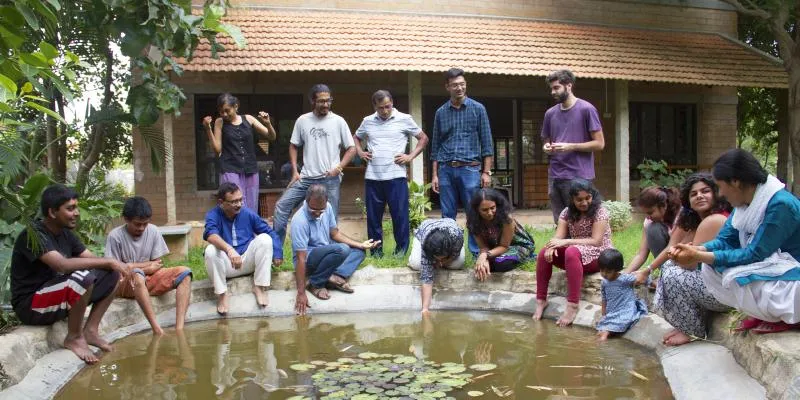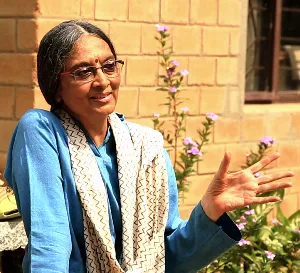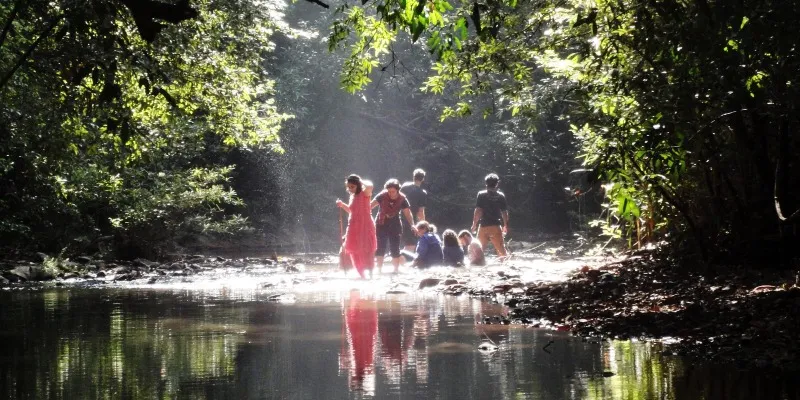Bhoomi College is helping environment enthusiasts get one step closer to nature
Even as Seetha pursued her MBA from IIM-A, her heart and mind knew she had a different calling. Her passion for understanding nature and helping the community workers led her to start Bhoomi Network. Years later, she started Bhoomi College to educate people who shared her passion and longed to work alongside nature.

Located amidst four acres of lush greenery on Sarjapur main road, Bhoomi College has been instrumental in shaping the lives of those seeking to learn about ecological sustainability and making a difference in the environment.
The college came into being in 2012, with a batch of just 10 students, and the efforts of Seetha Ananthasivan (62).
The journey of Bhoomi College
Right from her college days, Seetha had been inquisitive about nature and had always wanted to work towards nature conservation. Spending time at the family-run tea estates of Munnar, Kerala, during her summer vacations, fulfilled those desires. “Community and nature are two important things in my life,” she says. Seetha worked with people at the grassroots-level in the tea farms to improve her understanding of nature and how she could bring about a difference in the community through the knowledge she had acquired. It was during this time that Seetha started reading books on nature conservation, such as Small is Beautiful: A Study of Economics as if People Mattered by EF Schumacher and The Limits to Growth, to educate herself on the subject.

Soon after, Seetha enrolled into an MBA programme at the Indian Institute of Management (IIM)–Ahmedabad to later realise that she did not want to venture into the corporate world. “Corporates are highly non-ecological and are keen on maximising profits,” she says. Determined to work towards nature conservation, Seetha took up a job at the World Worldlife Fund (WWF)—India. However, due to her background in management, Seetha was entrusted with tasks, such as sponsorships and marketing that were far from her actual interests, and she quit the job a year and a half later.
In 1995, Seetha, along with six others, started the K.N.A. Foundation—the trust which supports Bhoomi College. She later began Bhoomi Network in 2008 which organised workshops, conferences and produced a magazine called Eternal Bhoomi.
The campus is collocated with The Prakriya Green Wisdom School and boasts of over 150 species of trees and an organic garden for students to have hands-on experience. As mentioned on the college’s website, solar energy fuels 90 percent of the campus’ energy requirements. The college is also involved in paper recycling to a certain extent, mentions Seetha.

The college offers two one-year postgraduate diploma courses: Holistic Education and Science and Management for Sustainable Living. The college curriculum is structured to go beyond mere academic learning and includes field trips, workshops, documentaries, and a three-month internship. “Teaching about the environment through textbooks is insufficient,” says Seetha. “Practical experience is the more appropriate approach as there is a need to inspire people.”
Each year, the college receives about 20-30 students in the age group of 20-30 years, with the oldest so far being a sexagenarian. Yes, there is no upper age limit to study in this college. The college has a staff of 30, with four full-time faculty members, and it is frequented by renowned persons, such as Satish Kumar, Co-founder of Schumacher College in the United Kingdom, Vandana Shiva, Founder-Director of Navadanya and the Foundation for Research in Science, Technology and Ecology, and Devinder Sharma, journalist and author of GATT and India: The Politics of Agriculture.

What sets apart the college’s courses from those that offer postgraduate programmes in environmental studies or sustainable development? “We, at Bhoomi,” Seetha says, “focus on self-initiative learning. We encourage people to go deeper in their area of interest. Also, we don’t evaluate learning through exams.” Students share their observation and learnings through artwork, presentation, dance or any form that they find suitable. It is not a college but an expanding community, she adds.
Student experiences
Having finished the course this year, 23-year-old Nikita Rao describes the one-year course and living in the campus as one of the best experiences of her life. “Bhoomi was more about self-exploration than intellectual learning. Whatever we were learning, we were applying around the year. We were living it. It is an emerging session in the curriculum.”
The wide age spectrum of students brought with it the various experiences of people and there were plenty to learn from, says Nikita. “It is also about how you connect with the outside world. We also worked on honing ourselves.”
Throughout the time spent there, she says there were a lot of practical experiences, reality checks involved. The students went on field trips, visited several farms, worked in the organic garden and the kitchen. Since some of the students stayed back in the hostel, Nikita says that many vegetables were harvested from the organic garden and cooked for their consumption, providing nutritious and healthy meals.
Read More-
How these agri-startups are helping farmers battle drought and poverty
With myHarvest, city dwellers are growing their own pesticide-free food
Back to basics: when mud, bamboos, and timber houses help fight climate change
Aliston Texeira, a former student of the college is now teaching a module on permaculture. Aliston quit engineering and did a course in agriculture before deciding to work at Bhoomi. However, after going through the college curriculum, he decided to enrol in Science and Management for Sustainable Living programme for better understanding. The course, he sums up, provides the students with a holistic view of everything.

Future plans
Unlike most educational institutions that aim towards expansion after initial years, Seetha says that they are not looking to grow bigger. Instead, she says that they are looking to support and provide guidance to others who would like to start something similar to what she and others have begun.
Seetha reiterates that there is a need for ecologically sensitive people. “If we don’t feel a sense of belonging to one piece of earth, what are we really doing?” she asks.







